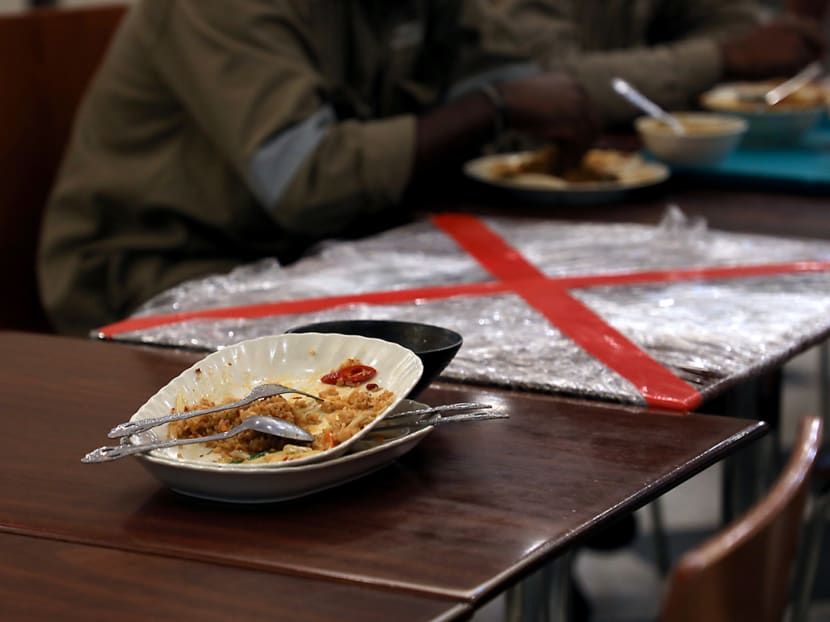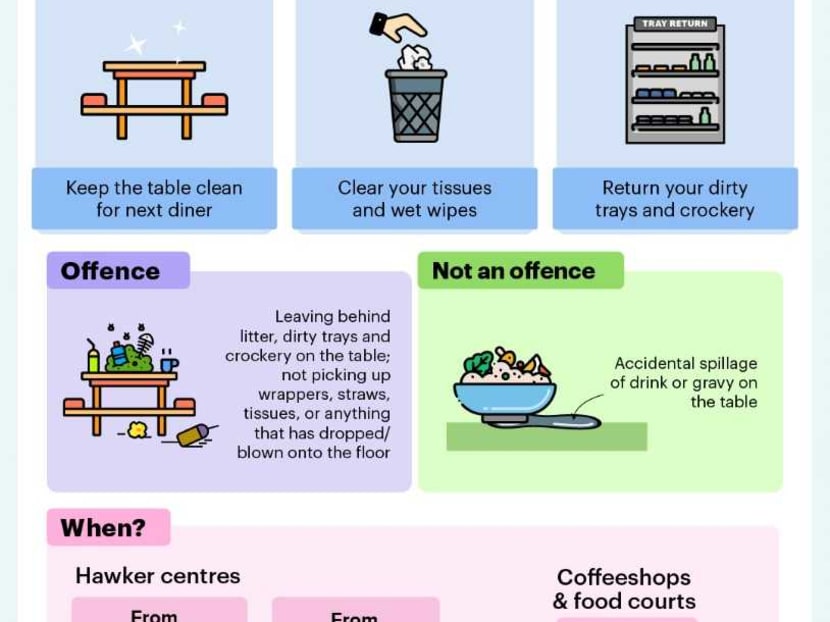Failing to clear your table could soon mean a S$300 fine. Here’s what you need to know
SINGAPORE — The authorities may soon impose fines of S$300 or more on diners at hawker centres, coffee shops and food courts who leave dirty trays, crockery and litter on tables, in a tougher approach to a long vexed issue. How will the change work in practice?

The authorities will be taking a firmer line against those who leave dirty trays, crockery and litter on their tables.
SINGAPORE — The authorities may soon impose fines of S$300 or more on diners at hawker centres, coffee shops and food courts who leave dirty trays, crockery and litter on tables, in a tougher approach to a long vexed issue. How will the change work in practice?
The move, announced on Friday (May 14) by the National Environment Agency (NEA), comes amid the Covid-19 pandemic, which has underscored the importance of public hygiene as a way to keep the virus at bay.
Extensive educational efforts over the years by the authorities have yielded disappointing results, with only about a third of diners returning their trays now.
Here’s what you need to know about the new enforcement action:
When will enforcement kick in?
Enforcement will kick in on Sept 1, beginning at hawker centres.
In the lead up, from June 1 to Aug 31, NEA will take an advisory approach, where ambassadors, volunteers and NEA officers will remind diners to clear their tables. During this time, no enforcement action will be taken, NEA says.
Enforcement will be extended to cover coffee shops and food courts progressively from the fourth quarter this year.
What are the penalties?
First-time offenders will have their particulars taken down and be issued with a written warning, the agency said. Second-time offenders will be fined S$300 and subsequent offenders may face court fines.
Will NEA take enforcement action against the elderly, the disabled, or children under 12?
No, enforcement action will not be taken against the elderly or the disabled who are unable to clear their tables. For children, enforcement officers will educate and advise children why it's important to clear their tables after their meal.
If I accidentally spill gravy or my drink, is that considered litter?
No, NEA will not take enforcement action in such instances. Enforcement will take a pragmatic approach, the agency says. But diners can still help to clean the spilled gravy or drink to help keep the table clean.
What if my litter is blown onto the ground?
Allowing your rubbish to be blown onto the ground in a public place and not picking it up is considered littering, so yes it is an offence.
Is it an offence if I clear my tray but leave items such as prawn shells and fish bones on the table?
Yes, it is an offence to leave behind any litter on the tables. All forms of rubbish, including shells and bones, should be thrown in the bin and not left behind on tables.
Why is it my responsibility to clear tables at public eateries?
Public dining places are set in an open environment with high footfall, accessible to all members of the public. Keeping these places clean is an act of consideration for other users, and it also reduces the risk of disease transmission, NEA says.
Will cleaners lose their jobs if everyone clears their own trays?
No, cleaners will still be required to maintain and upkeep the general cleanliness of dining places, including wiping and sanitising tables, and clearing and sorting dirty crockery at designated tray return points.
Having diners clear their own trays will also reduce the workload of cleaners, whose average age is 60. NEA adds that this will go some ways in helping to redesign their job role.
Mr Tony Chooi, president of the Environmental Management Association of Singapore, has also assured that there is no worry that cleaning staff might lose their jobs because of more people clearing their tables.
Is this a new law?
No, NEA is not enacting a new law. Leaving litter on dining tables is already enforceable as a littering offence under Section 17(1) of the Environmental Public Health Act
Is the Government being too heavy-handed for enforcing table littering?
Simply put, NEA says its efforts to encourage diners to clear their tables have not been enough to change habits.
Last year, the SG Clean movement was launched to rally the community to raise cleanliness standards of public spaces.
And in February, NEA launched a “Clean Tables Campaign” to urge diners to clear their tables after their meals. But the effort barely moved the needle when it came to diners’ habits, and the average rate of people returning their trays only edged up from 33 to 35 per cent before and after the campaign.
Given this less than satisfactory state of affairs, and with the Covid-19 pandemic serving as a backdrop, the agency thus decided to toughen its enforcement stance.

Infographic: Samuel Woo/TODAY











